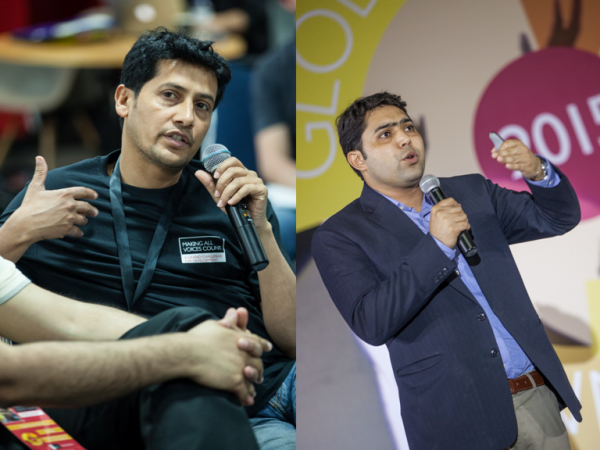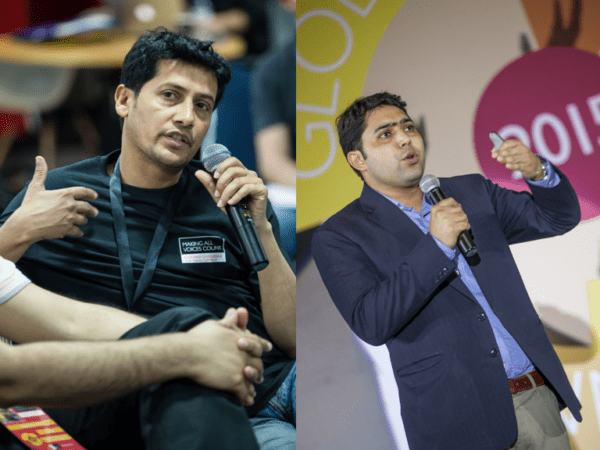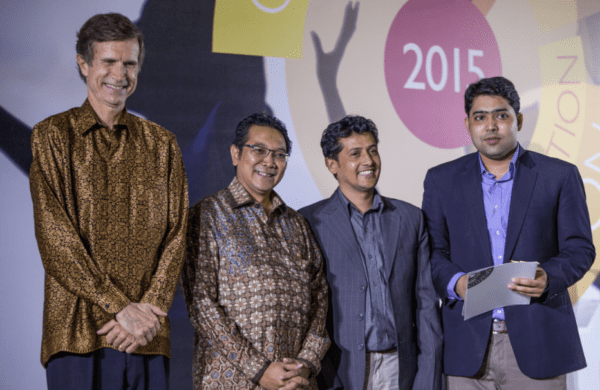NEWS
May 4, 2015

IN BRIEF
By: Narayan Adhikari, South Asia Representative, and Fayyaz Yaseen, Pakistan Ambassador, for the Accountability Lab. Last month, Narayan and Fayyaz took part in the finals of the Global Innovation Competition (GIC) 2015. In this blog, originally published by Making All Voices Count, they reflect on the GIC process, the people they met, and the lessons learned. Narayan Adhikari and Fayyaz Yaseen from Accountability Lab Hundreds of individuals and organisations from around the world applied to Making All Voices Count’s Global Innovation Competition, and we were thrilled to be one of the ten selected finalists to take part in the week long mentorship and pitching programme in [...]
SHARE
By: Narayan Adhikari, South Asia Representative, and Fayyaz Yaseen, Pakistan Ambassador, for the Accountability Lab. Last month, Narayan and Fayyaz took part in the finals of the Global Innovation Competition (GIC) 2015. In this blog, originally published by Making All Voices Count, they reflect on the GIC process, the people they met, and the lessons learned.
Hundreds of individuals and organisations from around the world applied to Making All Voices Count’s Global Innovation Competition, and we were thrilled to be one of the ten selected finalists to take part in the week long mentorship and pitching programme in Jakarta.
The week brought together some incredible organisations working on everything from budget monitoring in Nigeria to disaster accountability in the Philippines. We even visited the inspiring Governor of Jakarta, Basuki Tjahaja Purnama, and learned about his impressive efforts to make Jakarta a smart, livable city for all.
We had in-depth conversations, incredible workshops and received tons of useful feedback from mentors and friends. Here are five things we learned about how to make sure your voice counts:
1. FOCUS IS KEY
It’s essential to focus on a single effort, rather than trying to do too much. Mission creep is a danger in places where accountability is absent and funding can dictate priorities. For example, Frei Sangil’s tool, Balangay uses a simple cloud-based system to manage disaster response in the Philippines. It’s open-source, so the team have made it extremely simple to use and the focus is clearly on building communication channels between stakeholders. Learn more about this idea below:
Similarly, the Citizen Justice Network investigates and highlights unreported miscarriages of justice in rural South Africa. The team keeps things simple but effective, training local activists to compile reliable reports and finding ways to raise the issues in local and national media. It’s contextualized, it’s focused, and it works.
2. IT’S ALL ABOUT THE PEOPLE
Making All Voices Count is all about equipping people with tools and skills to make their voices heard and make power-holders responsive.
Citizens are often divided, but we have to bring them together to find their collective voice for change and collaborative problem-solving.
This means working with people from the bottom-up, like our friends Polly and Lajaro from Mozambique who have created a fantastic initiative called Face2Face. This tool tracks the experiences of people using Mozambique’s new Right to Information Law to obtain public information. Documenting their experiences, and through social media, the project highlights and challenges the barriers Mozambicans face in their everyday lives.
Likewise, our friends at BudgIT in Nigeria have been engaging Nigerians to track budgets in their communities and make sure public funds are spent honestly. For us, this is what accountability is all about.
3. TECHNOLOGY IS ONLY PART OF THE SOLUTION
With more and more people online, tech-tools are essential to engage them in the process of governance, but these tools have to fit the context, needs and understandings of citizens.
Online tools are only sustained through offline communities, and it is there that the hard work has to be done to create momentum for change.
One of the winners of the GIC understands this very well; the Voice for Women effort in Indonesia supports sustainable dialogue between local governments and the people through online and mobile platforms, but also through face-to-face discussions. This way, everyone can have their say. Learn more about this idea below:
4. GOVERNMENT HAS TO BE AT THE CENTER
Making voices count has to be about getting governments to act. In Nepal, the Accountability Lab engages with the government to highlight honest civil servants through Integrity Idol. This allows citizens to engage with the authorities in a constructive rather than conflictual way.
It helps build trust and navigate politics by “naming and faming” rather than “naming and shaming”. This leads to shifts in culture and positive actions then follow.
In Indonesia, the government itself has taken the initiative in a slightly different way with the Jakarta Smart City platform that provides information on everything from bus schedules to museum exhibitions to street food stalls. Citizens can provide real-time feedback and the authorities respond, bolstering the social compact.
Governments can’t do everything, but they can be transparent and citizen-focused in what they do.
5. EFFECTIVE DESIGN REQUIRES CO-CREATION
Citizens can make their voices heard, but creating accountability requires a joint effort between people, the government, the private sector, civil society and the media.
We need to find ways to move out of our silos and projectized approaches to connect dots, understand synergies and find collective solutions to shared problems.
Making All Voices Count is the perfect venue to bring reform champions together to reflect, learn, innovate and collaborate. More than anything, the GIC is building a network of change-makers around the world who can provide mutual support, counsel and ideas around the issues. This makes co-creation so much easier.
At the Lab, we’re trying to build the accountability eco-system in the countries in which we work and the week in Indonesia, more than anything else, helped us to realise we are not alone. As the Making All Voices Count team recently pointed out “Now the Hard Work Begins”- and we’re excited to make it happen.


